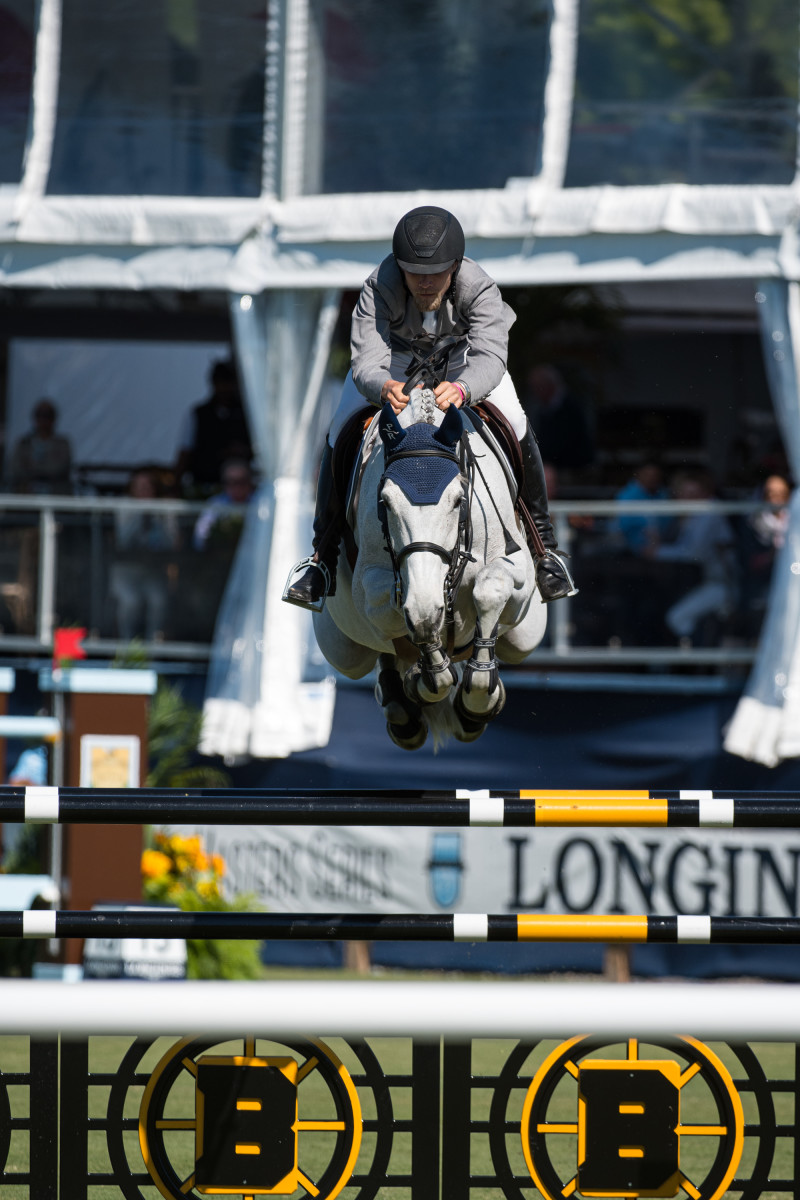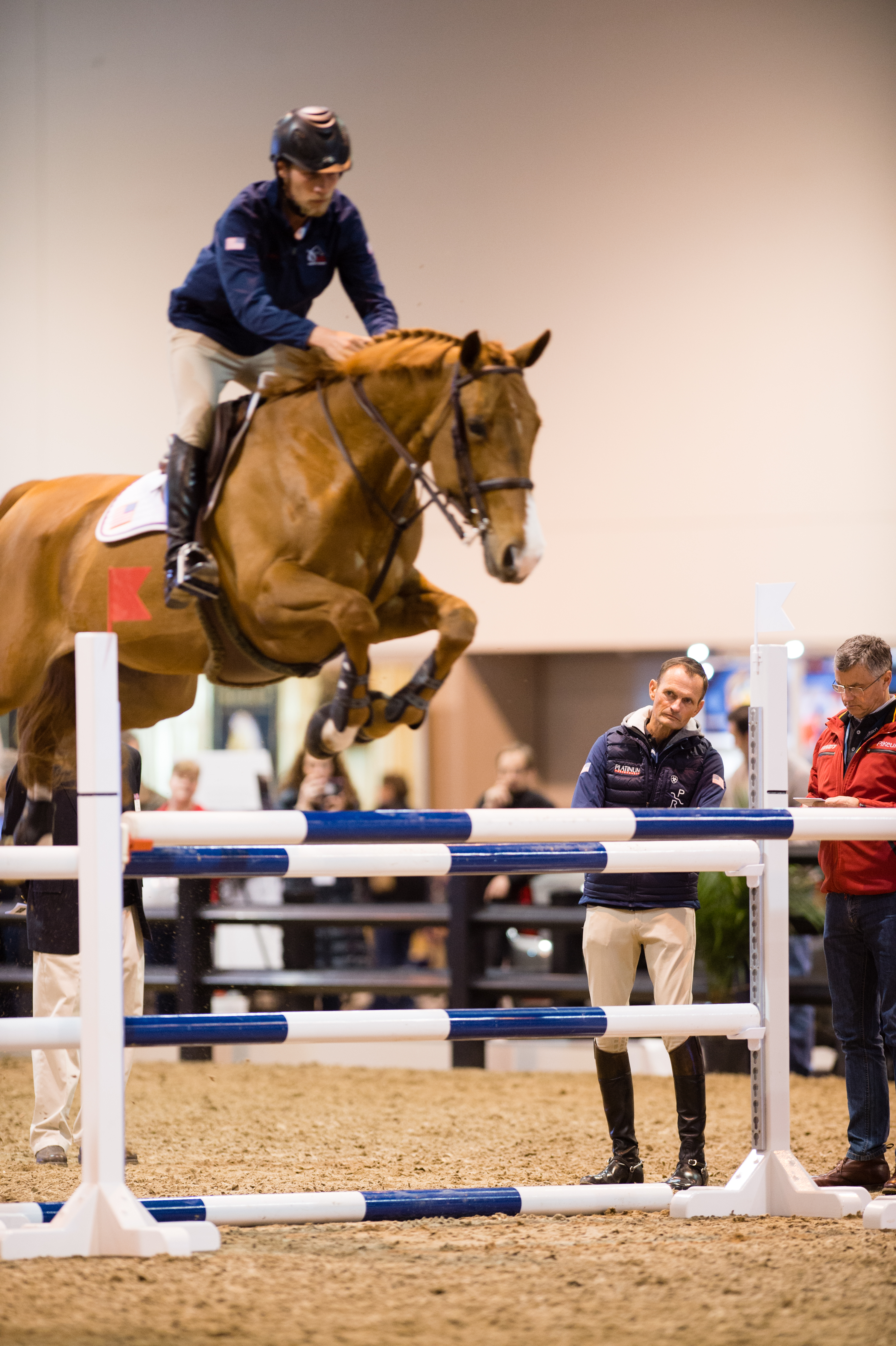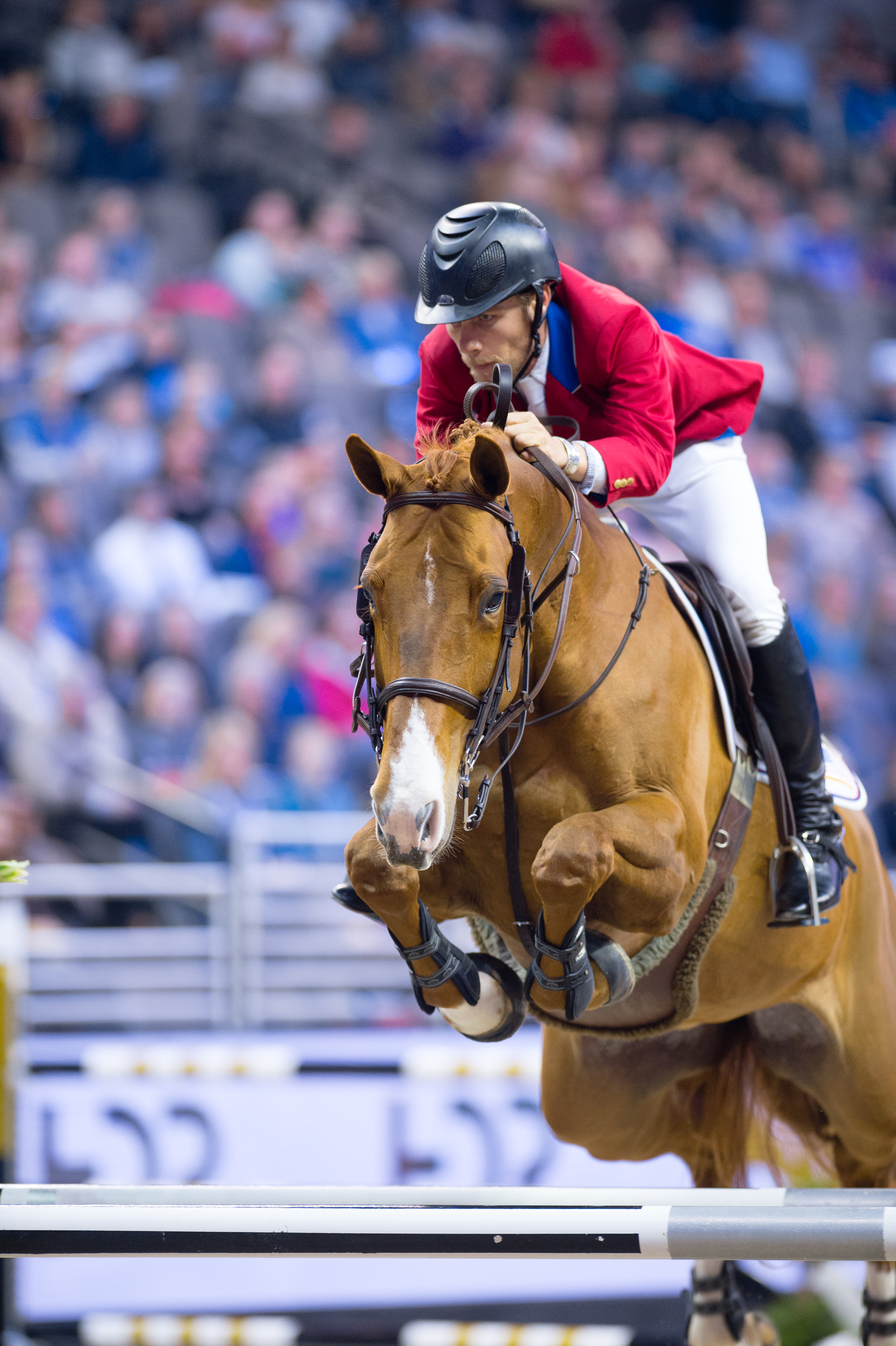Grand prix rider Karl Cook has had several impressive wins over the past six months. He captured the $100,000 HorseTaxi Grand Prix in Thermal, California, on March 8, with his longtime partner, the 13-year-old Holsteiner gelding Caillou 24. Also in the class, Karl placed third with the 11-year-old Belgian Warmblood Ircos IV. In addition, Karl recently finished in the top spot in the Longines FEI Jumping World Cup™ North American Western Sub-League after winning the Sacramento qualifier last fall with Caillou. The pair also finished second in the New York qualifier and had top-10 placings in the Del Mar and Wellington qualifiers.

Karl and I spoke in Wellington in February, where he had traveled from his home base Pomponio Ranch in Southern California. During our conversation, he talked about his dedication to horsemanship and his belief that understanding and tending to his horses’ physical well-being is critical to effective communication between horse and rider.
This concept is something he has learned, in part, from Eric Navet, the 1990 World Equestrian Games team and individual gold medalist, who moved from his native France in 2013 to become Karl’s coach. Another valuable member of the Pomponio team is French international veterinarian Philippe Benoit. The team is mixing old-fashioned horsemanship with looking outside the box for new ways to improve their horse-centric methods.
During our chat, Karl talks about what makes a good horseman, which for him has involved establishing a program dedicated to keeping his horses happy and healthy. The program aims to prevent injuries by focusing on every detail of the horse’s care and management, including collecting and analyzing data about each horse from a variety of sources.
Karl also talks about how the Pomponio team is videotaping horses and combining that with new software to evaluate how a horse moves, again with the aim of understanding and detecting changes in the horse’s way of going that could indicate the very beginning of a health issue. You can read more about this in an article with Karl and Eric, Classic Meets Cutting Edge.
Karl’s pride in his program was evident when I asked him what the highlight of his career has been so far. He said it was his consistent partnership with his World Cup horse Tembla, who never had an injury and retired at the end of 2018, happy and healthy.
You can listen to the full interview wherever you listen to podcasts, but in the meantime, below is a snippet of our conversation.
1. In the article that you and Eric did for Practical Horseman, you discuss horsemanship and how Eric is such a horseman. Can you talk about that?
KC: It’s all well and good to be a great rider, but if you don’t have a great program, that hinders your ability to be able to ride, and beyond that, I think lot of people, they’re all about, they have this idea that the better you are in the competition ring or the fact that you win makes you a good horseman by translation, which is just not factually correct.
It also depends on how you define horseman, but for Eric and for me, that’s not a linear comparison. You can be a terrible horseman and win a class. I think learning horsemanship and the value of it and the importance of it, you know a lot of it is the simplicity of it. A lot of people think it’s hard or technical or complicated and it’s really not. It’s disciplined in its simplicity, and people like to think it’s complicated because it simplifies how they feel about themselves not being disciplined. But it’s really not complicated. You just have to be disciplined.

2. What kinds of preventative things do you do with the horses?
KC: It depends on the horse. We know the horses so well because we’re able to keep them going for long periods of time
If you are really good with having them properly shod, if you have really good shoeing that’s appropriate for the horse and you have a saddle that fits, and you pay attention to the topline, you don’t have to look at the legs. You basically can ignore the fact that the legs exist. Because an injury in the leg is a symptom of something somewhere else. If you have an injured suspensory, that’s not a fault of the suspensory. That’s a compensation-based injury due to something else. So if you fix the suspensory but not the cause then, hey, guess what happens again. So we work almost exclusively on the topline of the horses. We change how we flat when we need to. We can be very precise and sensitive because we built the system to accommodate for that. We’ve pushed ourselves to figure out how we can find things earlier and earlier and earlier before it’s an injury, before it’s a stiffness. Before it causes an injury, I want to know it and I want to fix it so then it’s not an issue.
3. Who are some of the important or influential horses in your life?
KC: They’re all influential. You learn things from every single horse. Some because of circumstance you learn more and some because you’ve had them longer but they’re all important.
Horses show you who you really are as a person and so it’s important that you like who you are and not just who you think you are. Your actions are basically who you are. All we are are words and actions and so you interact with the horse not with words so it’s actions. So if you get frustrated easily, your horse is going to tell you.
The circumstance is going to come about and you’re going to get frustrated but that’s an indicator and that’s something that you can work on. If you actually think about and say, ‘This horse is making me frustrated”—let me reword that. “I get frustrated when the horse isn’t doing what I think I’m telling it to do.” Again, the horse doesn’t care who you are. The horse doesn’t know how much money you spent on it. The horse doesn’t know about your hopes and dreams for what you feel the horse should do for you. It doesn’t know or care or ever will. Some horses might have fun jumping but that doesn’t mean they have that same anthropomorphic drive that we have. But I think they show you who you are. Do you get frustrated easily? Do you get emotional? When you get nervous, what happens? And how does your feeling and emotions impact the horse. And I think for me, they kind of shine a light that we block off in our brains.

4. What do you consider the highlights of your career so far?
KC: We retired a mare of mine [Tembla] at the end of 2018 and I loved the mare and I learned a lot with her. But what I was really proud of was that consistent output. She never had an injury, she was always consistent and we were able to work together consistently. She retired when it was right. She is happy and healthy. Now she lives in a paddock with many ponies.
Listen to the full interview here.
About the Practical Horseman Podcast
The Practical Horseman podcast, which runs every other Friday, features conversations with respected riders, industry leaders and horse-care experts to inform, educate and inspire. It is co-hosted by Practical Horseman editors Sandra Oliynyk and Jocelyn Pierce. Upcoming conversations are with the 18-year-old rising star Brian Moggre, international show jumper Andrew Welles and hunter rider Hannah Isop. Find the podcast at iTunes, Stitcher and Soundcloud or wherever you get your podcasts.






